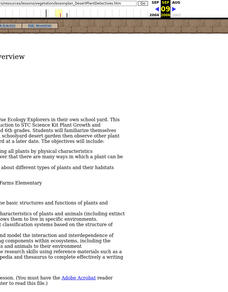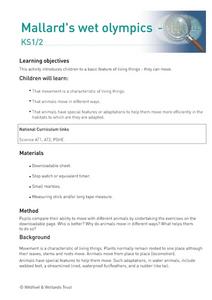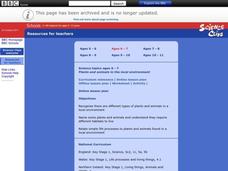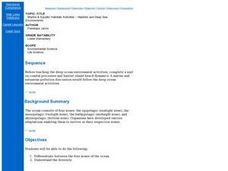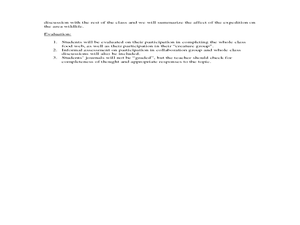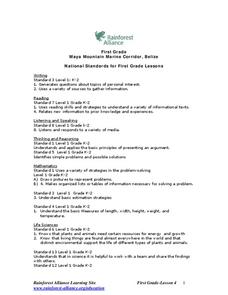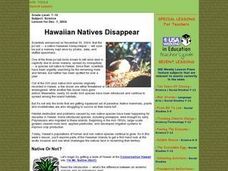American Museum of Natural History
Welcome to the Dzanga-Sangha
One ecosystem is home to numerous habitats—how diverse are they? Pupils interact with an online lesson to explore three habitats in a rain forest ecosystem. They discover connections between species and how they depend on each other for...
Curated OER
Desert Plant Detectives
Students examine and categorize plants in their own schoolyard desert garden and then observe other plant areas of their schoolyard.
Curated OER
Mallard's Wetland Olympics
Students observe plants and animals of a wetland and then compare their ability to move with different animals by undertaking the exercises on a downloadable page.
Curated OER
Rainforest Rescue
Students explore threats to diversity in the Central African rainforest. They use a guided website to research animals that are threatened with extinction, examine human uses of the rainforest and think about what they can do to help...
Curated OER
Plants and Animals Depend Upon One Another
First graders study plants and animals and how they depend on one another. They also study that plants give energy to animals and provide oxygen needed for life. Finally, 1st graders give examples of the roles plants and animals play...
Curated OER
Plants and Animals in the Local Environment
Students recognize the different types of plants and animals living in a local environment. They determine how they require different habitats to live, and relate simple life processes to plants and animals found in local environments.
Curated OER
Habitats
Students participate in an online lesson to determine that different plants and animals are found in different habitats. They use food chains to show feeding relationships in a habitat, and see that nearly all food chains start with a...
Curated OER
Understanding Life System: Growth and Changes in Plants
Third graders research ways in which plants are essential to humans. In this Global Peace instructional activity, 3rd graders participate in tasks, such as creating a propaganda poster. Students may watch the film, The Lorax, as a...
Curated OER
Data Analysis: bird habitats in rice farms
Fifth graders make a graph and write an essay to interpret the data of birds that take advantage of habitats near rice farms. In this data lesson plan, 5th graders calculate the information given to them and interpret it in an essay form.
Curated OER
Habitats and Deep Sea Environments
Students examine and identify the characteristics of the four zones of the ocean. They discover the amount of diversity in marine habitats. They also explore the adaptations organisms have that have allowed them to survive.
Curated OER
Animals and the Food Webs that Love Them
Learners study the animals that Lewis and Clark would have encountered. In this animals lesson students study the food web and how human populations have affected them.
Curated OER
Hunt for Habitats
Students review components of a habitat and go on a hike around a pond and woods exploring different habitats and the plants and animals that use them. They examine mammal pelts and discuss the life histories, adaptations, and positions...
Curated OER
Locating Echo
Students read the book The Adventure of Echo the Bat. For this animal science lesson, students read the book and create a chart labeled "Land Feature," "Habitat," and "Food." Students fill in the table according to where the character...
Curated OER
Who Takes Care of the Maya Forest Corridor?
First graders study the animals in the Maya Forest Reserve. In this conservation lesson plan, 1st graders create a graph to compare the environment of animals to their own. They design a 3D model of these two environments.
Curated OER
Rainfall Mapping
Students explore rainfall and habitats. In this rainfall lesson, students explore the relationships among rainfall, vegetation, and animal habitats. Resources are provided.
Curated OER
Creating a Pond Habitat
Students create a pond habitat inside and outside their classroom. In this pond lesson plan, students create a habitat with animals, water, and plants in order to create a proper pond habitat.
Curated OER
What is Cacao?
Students use the Internet to learn about the cacao plant. In this plants lesson, students complete a KWL chart on chocolate, learn about cocoa plants and discuss the parts of a plant. Students use the Internet to learn how the cacao...
Curated OER
The Living Environment
Students use a spoon, clothespin, scissors, and toothpicks to simulate how animals get food in their environment. In this environment lesson plan, students learn about the adaptations animals make in order to survive.
Curated OER
A House for Me- Ocean Environments
Learners explore ocean environments. For this ocean environment lesson, students identify the things ocean animals need for survival. Learners use KWL charts and search the Internet collecting information about ocean habitats. Students...
Curated OER
Hawaiian Natives Disappear
Students explore parts of the Hawaiian Islands to get a examine the exotic invasion, and see what challenges the natives face in reclaiming their territory. They identify the changes in the environment that have been the hardest on the...
Curated OER
Mountains
Explore the mountain habitat with this collection of slides. The climate is described, along with the associated plant and animal life. Some of the pictures are attractive, but some leave much to be desired. There is a generous amount of...
Curated OER
"Habitats"
Students complete a unit of lessons on animals and animal conservation. They observe a square meter of ground outside the school, set up a model environment, analyze an owl pellet, grow bread mold, and explore various websites.
Curated OER
Habitats of the World
Students complete a unit of eighteen lessons that cover climate, geography, location, plants, and animals of each of the five habitats. They are also introduced to habitat destruction and discuss ways to protect the environment. They do...
Curated OER
Animal and People Habitats
Students examine how animals create a unique space in which they can live. Students read a poem about animals' habitats discuss the habitats. They draw a space of their own and write a poem that describes their habitat.



